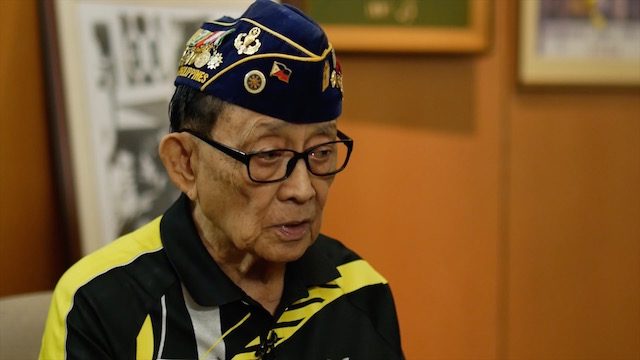SUMMARY
This is AI generated summarization, which may have errors. For context, always refer to the full article.

MANILA, Philippines – Former president Fidel V. Ramos told Rappler that there is an emerging culture of impunity in the Philippines because of the spate of killings linked to the government’s war on drugs.

Ramos called for an internal cleansing of the Philippine National Police (PNP), as he recalled how he said they were able to do it during his presidency. He said there’s a need to reconsider President Rodrigo Duterte’s plan to tap the military to lead the war on drugs.
Ramos told executive editor Maria Ressa on Rappler Talk:
Maria Ressa: Do we have a culture of impunity now?
Fidel Ramos: I think it is starting to become like that, although I don’t want to call it that because being a senior citizen, who had been through the experience and done it, I’d like those in command now starting with President Duterte down the line…. that hopefully based on the guidance from the very top, there could be positive change the way we do things in this country. I’m still hopeful about that.
He urged Duterte to follow the 5 pillars of the justice system – community, law enforcement, prosecution, courts, and corrections – and not to allow a “one-way kind of decision-making in law enforcement.”
“The entry of our president, President Rodrigo Roa Duterte, into the picture indeed has changed our law enforcement situation very much and also our human rights and criminal justice system,” he said.
Ramos added that he does not like the idea of tapping the military to lead the war on drugs and conduct law enforcement operations, which are traditionally the job of the police.
He presented the scenario where the suspect is a “poor person in slippers, in a squalid area, maybe in the slums… facing an invading army with all the weapons of vast destruction.”
The cops and the soldiers follow very different rules of engagement, Ramos said.
He recalled how he removed rotten cops, including 63 senior officers early on during his presidency, which ran from 1992 to 1998.
He said he gathered 300 of his most senior police officers whose reputations were “unassailable” and gave them 4 months to list down names of those who needed to leave the service because they were “no longer doing the job properly.”
Some were given options to retire early. Others were removed dishonorably.
“The idea of getting a group of generals who are impeccable based on their service record and their personal character, of course, is obvious – not one man can judge the person of such a big force as the PNP [which was] at that time was 130,000 people.”
And as Duterte’s centerpiece campaign is being linked to over 7,000 deaths, the former president reminded cops that they are supposed to shoot to disable and not to kill.
“Police work, which is a little different from military operations, does follow its basic rule of engagement which is you shoot to disable but not to kill. Unless the opponent’s gun is pointed at you to kill you, then you can shoot the guy in self-defense,” said Ramos.
“But normally the mantra is shoot to disable and not to kill because do not get rid of your number one witness or prospect of knowing the whole truth about the matter, because you cannot investigate the guy who’s already in the funeral parlor. But surely you can investigate a guy fully if he’s just wounded.”
Korean businessman’s murder
Ramos also said the “gruesome” murder of a Korean businessman inside the PNP headquarters is a national shame that will leave a lasting negative imprint on how the world will view Filipinos.
Ramos, a Korean War veteran, said South Korea has celebrated the Philippines’ contribution to the restoration of its democracy during the 1950s. He deplored how the murder of one of its citizens inside Camp Crame has hurt the Philippines’ reputation.
“He (Korean businessman Jee Ick Joo) was killed brutally, according to the stories. To me that is especially gruesome, but also in terms of the Philippines towards the Republic of Korea, or South Korea, it is something that’s very shameful on the part of Filipinos doing this to a [citizen of a] very friendly close ally,” Ramos said.
“Of course, any kind of gruesome murder like what has been reported is unacceptable, but if this is the way we treat our friends and allies, I don’t think we’re going to [have a] good reputation in the world. Not too long from now, we will be labeled as that kind of people which, of course, I deplore.”
Meanwhile, Malacañang has responded to Ramos’ earlier comment on Duterte’s decision-making style.
In the same Rappler Talk interview, Ramos said he is concerned that Duterte, whom he supported in the May 2016 elections, is making decisions – particularly on policies and security – without first consulting even his Cabinet members. (READ: Ramos worries about ‘lack of consultation’ in Duterte gov’t)
Presidential Spokesperson Ernesto Abella maintained that Duterte listens to opinions but supposedly has a different style from Ramos. Abella on Saturday, February 11, said Ramos is “more managerial and more corporate” while Duterte “is what you would call a transformational leader… who can do something out of nothing.” – Rappler.com
Add a comment
How does this make you feel?
There are no comments yet. Add your comment to start the conversation.